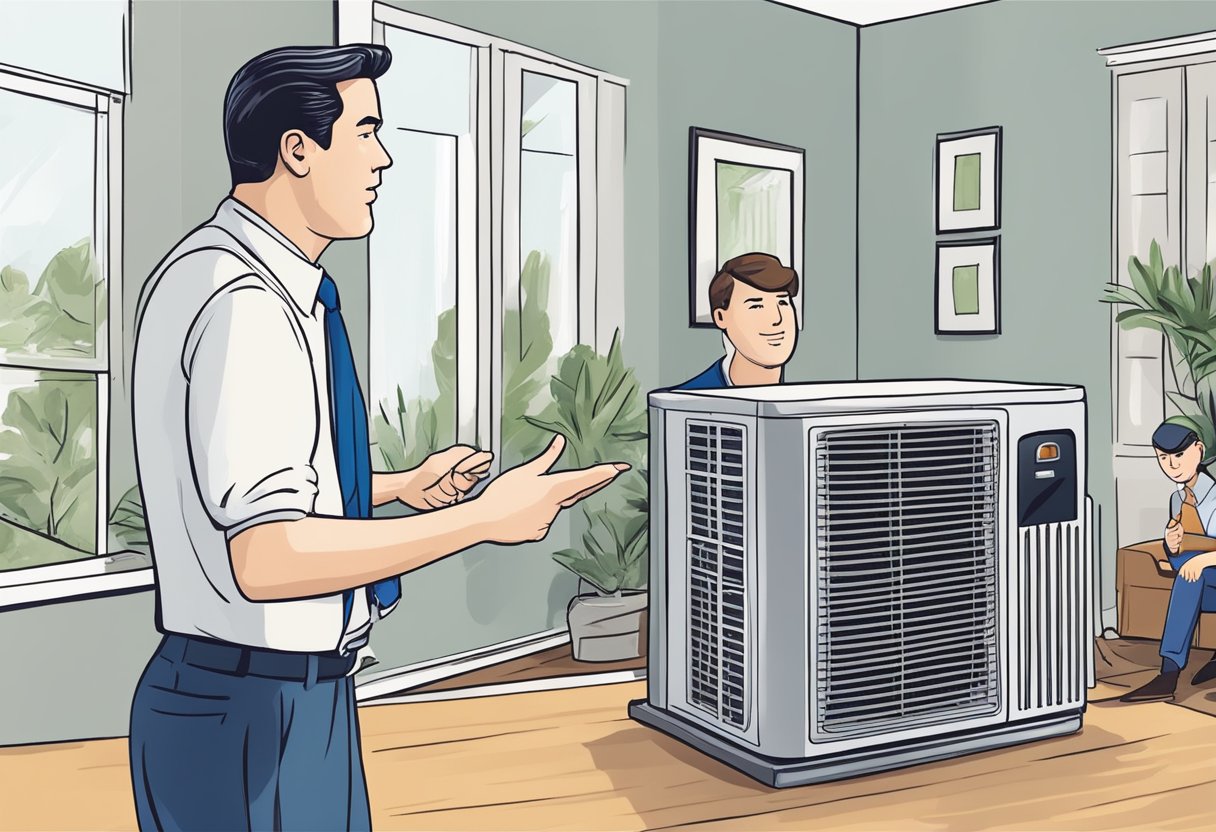
- Insurance
-
-
Most Popular
-
-
- Investing
-
-
Most Popular
-
Best Of
-
-
- Banking
-
-
Best of
-
Banking Reviews
-
Explore More
-
-
-
- Loans
-
-
Most Popular
-
Explore more
-
-
- Credit Cards
- Reviews
- Making Money
How to Get Home Insurance to Pay for Air Conditioner Repairs and Replacements
Navigating the process of getting your home insurance to pay for air conditioner repairs or replacements can seem daunting. The key is understanding the specifics of your homeowner’s insurance policy and under what conditions it will cover your AC unit. Many homeowners are unaware that they could be eligible for coverage, which often leads to unexpected expenses.
Written by:
Home insurance typically covers sudden and accidental damage to your AC unit, such as damage from a storm or fire. Regular wear and tear or lack of maintenance are usually not covered. It’s crucial to know the exact terms of your policy to find out if your situation qualifies for a claim.
Once you determine that your AC unit’s damage falls under the covered conditions, you should gather all necessary documentation and file a claim promptly. Providing detailed information and evidence can help expedite the process and increase the likelihood of a successful claim.
Key Takeaways
- Understand your home insurance policy to see if it covers your AC unit.
- Damage caused by sudden and accidental events is usually covered.
- Promptly file a claim with detailed documentation to support your case
Table of Contents
Understanding Your Homeowner Insurance Policy
Homeowner insurance policies offer protection against various risks. Each policy comes with its specifics, which include coverage limits, exclusions, and deductibles.
Coverage Limits: These are the maximum amounts an insurance can pay for a covered loss. It’s crucial to know your policy’s limits to avoid any surprises during a claim.
Exclusions: Policies often have exclusions where certain scenarios or damages are not covered. This could impact coverage for items like air conditioners (ACs).
Deductibles: This is the amount you pay out of pocket before the insurance covers the remaining costs. Knowing your deductible helps you plan financially for repairs or replacements.
Many policies cover sudden accidental damage to home systems, including ACs.
Tips to Review Your Policy:
- Locate the declarations page to see the coverage limits.
- Read the policy details regarding exclusions and specific perils covered.
- Check for endorsements or add-ons that might offer additional coverage for your AC.
Consulting with your insurance agent is beneficial. They can explain complex terms and help identify what your policy covers and requires for claims. Understanding the policy ensures that you can effectively handle issues related to your home systems.
Does Your Home Insurance Cover AC Units?
When assessing whether home insurance covers AC units, various factors come into play. First, it’s essential to determine the reason for the damage.
Named Perils
Most policies cover damages caused by named perils like fire, theft, or vandalism.
Example:
- If an AC unit is destroyed by a fire, insurance likely covers the replacement.
Sudden and Accidental Damage
Some policies cover sudden and accidental damage to AC units.
Example:
- A tree falling on the external unit might be covered.
Key Factors to Verify:
- Policy Type:
- HO-3: Offers broad coverage, commonly used.
- HO-1 and HO-2: Usually more limited.
- Endorsements: Additional coverage may be added through endorsements.
- Deductibles: Understand the deductible amount to assess if claiming is worthwhile.
External forces
If external forces cause the AC unit to break, such as a power surge, coverage may be applicable under some policies.
When Does Home Insurance Not Cover Your AC Unit?
Home insurance policies often exclude certain scenarios.
Wear and Tear
Most home insurance policies don’t cover damage due to normal wear and tear. If your AC unit breaks down because of age or regular use, the repair costs are generally your responsibility.
Negligence
If the unit fails due to lack of maintenance or neglect, coverage is unlikely. Proper upkeep is crucial to ensure potential claims are valid.
Flood or Earthquake Damage
Standard home insurance rarely covers damage from floods or earthquakes. Separate policies are required for these disasters.
Intentional Damage
Damage caused intentionally is not covered. Tampering with or mishandling the unit voids any insurance claims.
Manufacturer Defects
Issues arising from factory defects are typically covered by warranties, not home insurance. Ensure your unit’s warranty is up to date for such problems.
Steps For Getting Your Home Insurance To Pay For Fixing Your Air Conditioner

To ensure your home insurance covers the cost of repairing your air conditioner, follow these essential steps: contact your insurance provider, choose a reputable repair service, submit an estimate for the repair, and complete the necessary documentation for filing a claim.
1. Call Your Insurance Provider
Begin by contacting your insurance provider directly. Reach out to them through their customer service number or use their online support options.
Explain the issue with your air conditioner clearly and ask if your policy covers the repair costs. Take notes on what the representative says, including any specific requirements or exclusions in your policy.
2. Look For An Air Conditioner Repairman
Search for a qualified air conditioner repair technician. Ensure the technician is licensed and has good reviews from previous customers.
Request a detailed estimate for the repair work, covering all labor and parts needed. Obtain multiple quotes if possible to compare costs and choose the best option.
3. Submit The Estimate Of The Repairing
Forward the detailed estimate from the repair technician to your insurance provider. Include any additional documentation the insurer requests, such as repair work scope and itemized costs.
This helps the insurer assess whether the repair falls within your policy’s terms. Keep a copy of the estimate for your records.
What documentation is required when submitting an AC unit claim to home insurance?
Prepare vital documentation including the original purchase receipt of the AC unit, maintenance records, and any previous repair logs.
You may also need photographic evidence of the damage or malfunction. Ensure all documents are clear and legible to avoid delays in your claim processing.
Summary
Home insurance coverage for air conditioning units can vary based on weather conditions, maintenance records, and insurance providers. Reviewing the policy details is crucial. Knowing the common exclusions helps manage expectations. Maintenance negligence often voids coverage. Using professional assessment for damaged units strengthens the claim. Documenting any damage accurately will support a claim.
Quick Questions
Yes, in states with extreme weather conditions like hurricanes or blizzards, home insurance policies often cover damage to AC units. Check with your insurance provider for specific coverage details related to weather-related damages.
The age and maintenance history of an AC unit can significantly impact insurance claims. Units that are well-maintained and relatively new are more likely to be covered. Conversely, older units or those with poor maintenance records may result in denied claims or reduced compensation.
Yes, there are differences in coverage for AC units among various insurance companies. Policies can vary widely in terms of what is covered, so it’s important to review the specifics of each provider’s terms. Some might offer comprehensive coverage, while others may have more exclusions. Always read your policy or consult with your insurer for clarity.

Join the MoneyMash community!
Sign up to get the latest personal finance news.
© 2025 MoneyMash an Element Road, LLC Company.
MoneyMash is an independent, advertiser-supported site. We may receive compensation when you click to apply for some products using the links that you find on our website. Opinions presented on our website are those of MoneyMash or our team of writers and reviewers who post their own opinions. For more information, please read the full disclosure.
